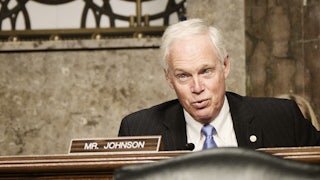Anyone wondering whether the still-emerging findings of the January 6 committee will impact the 2022 midterms should look no further than Wisconsin’s Senate race. Increasingly, Senator Ron Johnson, the Republican incumbent, is struggling to explain recent revelations from the congressional panel about how he almost received two slates of fake electors that his chief of staff tried to deliver to then–Vice President Mike Pence.
Johnson’s movements that day and new questions about him in relation to the larger insurrection have mostly been overshadowed by other January 6–related news. But questions about the senator are no less important and have spilled over into the Senate race—one that Democrats see as their best chance to knock off a GOP incumbent in a Senate they’re desperate to hold.
The latest development came late Friday night, when Politico revealed the name of the Republican operative who tried to pass the slates of electors to Johnson. That previously unknown operative, Mike Roman, has an extensive background as a Trump White House staffer, opposition researcher, and voter fraud alarmist. He is an alumnus of the Trump White House, the Koch brothers–backed outside groups, and multiple Republican presidential campaigns. In other words, he’s not the intern/ultra-green staffer Johnson initially described in response to questions from reporters. Roman has a long history of writing articles for conservative websites about alleged voter fraud; he also collected voter fraud claims to eventually get a Pennsylvania Republican seated in the state Senate and spread a video of alleged voter intimidation by the New Black Panthers.
The involvement of someone with that kind of intensely partisan history challenges Johnson’s early claims that the January 6 committee grossly exaggerated the events in relation to him that day and that it was a nothingburger of a story about the greenest of green interns quixotically trying to pass something on to Johnson. That was the Wisconsin senator’s initial explanation after the committee revealed that someone (Roman) had slates of fake electors from Michigan and Wisconsin that he wanted to pass through Johnson’s chief of staff, Sean Riley, to Pence. Pence’s legislative director, Chris Hodgson, rebuffed that attempt, writing to Riley in a text message, “Do not give that to him.”
Riley’s background is important here too. He rejoined Johnson’s office as chief of staff in January 2021. Before that he worked in the Trump administration’s legislative affairs office and prior to that spent years with Johnson. So we have a staffer who had direct ties to the Trump White House, working for a senator who often indulges in conspiracy theories and who publicly waffled on the 2020 election outcome (while privately conceding that “there’s nothing obviously skewed about the results”).
One former Republican chief of staff argued to me that the vetting system for what a senator sees worked in this instance. “What gets handed to a senator and when can have really profound implications,” that former staffer told me. “This is the ultimate example of it, but it happens routinely and for all kinds of reasons, which is why good systems and staff work is important. Sounds like the system worked in that instance.”
Johnson has tried to separate himself directly from the entire situation, but in congressional politics that’s just not how it works. When something happens in a lawmaker’s office, it’s almost always considered something the lawmakers themselves did.
Even so, as more details about the episode have emerged, Johnson has been flailing in his explanation of what happened. He eventually changed the story from something going on between low-level staffers (does anybody think a Senate chief of staff, a former White House legislative affairs staffer, and the vice president’s legislative affairs director are low level?) to that the fake electors came from Republican Congressman Mike Kelly’s office. Kelly’s office has denied Johnson’s accusations. Finger-pointing has ensued.
The Democrats vying to oust Johnson from his Senate seat have called for him to appear before the January 6 committee and even to resign. His movements concerning January 6, 2021, have come up in Democratic debates and fundraising—so far not to an overwhelming degree, but that’s likely to change in the general election, said Wisconsin Democratic Party Chairman Ben Wikler. “To win the Democratic primary, it’s table stakes that you are in favor of democracy,” Wikler said. “In a general election, it becomes a much more live issue.”
Johnson is regularly peppered with questions about January 6 by the Wisconsin press and national press, and he’s avoided weighing in as much as possible. Public polling shows there’s hunger among Wisconsin swing voters to see Trump prosecuted—and they still don’t know much about Johnson.
“We’re seeing it both in terms of covering the disclosure, the changing answers from the Johnson office and, frankly, now Johnson’s team is not helping itself when they’re doing stuff like saying, ‘Congressman Kelly should apologize,’” said Joe Zepecki, a Democratic strategist who is doing some work for the Defend Democracy Project, a group trying to amplify the January 6 committee’s work. Zepecki added: “Editorial boards like the [Milwaukee] Journal-Sentinel are weighing in, so I would say it’s still a live wire.”
Democrats face the same question in Wisconsin that they are dealing with in other high-profile races across the country—whether to focus on January 6 or abortion rights after the Dobbs v. Jackson Women’s Health Organization ruling or Donald Trump running again or something else.
Right now, Republicans are hoping interest in what happened on January 6 will be overshadowed by concerns about gas prices and the economy. “I think it’s noise for everybody except the hard-core partisans for who we already know how they’re going to vote,” said Wisconsin Republican strategist Mark Graul.
The primary will take place on August 9. Lieutenant Governor Mandela Barnes, recently endorsed by Senators Elizabeth Warren and Bernie Sanders, generally polls in the lead. Surveys show businessman Alex Lasry a close second. He has called Johnson “a seditious traitor and a danger to democracy.”
Trailing them are Outagamie County executive Tom Nelson, a populist with an energetic and dedicated following, and State Treasurer Sarah Godlewski, who felt a fundraising surge after the Dobbs ruling. Even so, Godlewski has been off the air for five straight weeks and eight of the last nine, according to an ad-tracking source.
The committee is not done sharing its findings. Some of that may include more about Johnson. No senator has been subpoenaed by the committee yet—possibly out of a sense of decorum that House members should stick to their own lane. But the interest in a few senators—notably Johnson, Josh Hawley, and Mike Lee—remains. Johnson has done nothing to answer the main questions about how he got to a place where his staff was trying to pass slates of electors to the vice president to help carry out a coup. The longer those questions persist, the bigger an opportunity Democrats have to turn the Wisconsin Senate race into a referendum on Johnson’s choices on and around January 6.






